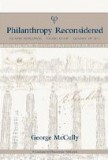Philanthropy Reconsidered

|
Title | Philanthropy Reconsidered |
| Author | George McCully | |
| Reviewer | Richard B. Gunderman | |
| Review Date | July 15, 2009 | |
| Publisher | Bloomington, Indiana: AuthorHouse | |
| Year | 2008 | |
| Rate this Book |
The time is ripe for a reconsideration of philanthropy. Tough economic times have driven some philanthropic organizations out of business, and forced others to carefully reexamine their mission and strategy. New technologies are changing the face of the field, particularly for smaller organizations whose size once constrained their ability to connect with important constituencies. State and federal governments are closely scrutinizing the activities of philanthropic organizations to ensure that they fulfill their responsibilities as bearers of the public trust (and in many cases, beneficiaries of tax-exempt status). Even the very meaning of the word philanthropy has been a subject of increasing contention.
George McCully, who left an academic career in the liberal arts to become a fundraiser, trustee, and most recently creator and president of the Massachusetts-based Catalogue for Philanthropy, has accepted this challenge in his book, Philanthropy Reconsidered. At a short 144 pages, the book’s five chapters examine the classical origins of philanthropy, its role in the founding of the United States of America, more recent historical shifts in the field, the future of philanthropy, and the potential for a new philanthropic paradigm. It also includes two appendices, one a case study of the Massachusetts system and the other a proposed taxonomy of philanthropy.
Drawing on the work of scholar Marty Sulek, McCully explores the first extant use of the word philanthropy, in Aeschylus’s Prometheus Bound. In it, the eponymous titan gives proto-human beings two gifts: fire, representing knowledge and the arts, and hope or optimism. Together the two gifts spawn mankind’s aspiration to make the world a better place. Philanthropy literally means “love of humanity,” and in bestowing these gifts Prometheus at once enabled human beings to become more humane and incurred the wrath of Zeus, who famously had Prometheus chained to a rock where each day an eagle ate his liver, regarded by the Greeks as the seat of desire.
What does the word philanthropy mean today? McCully considers a number of definitions, including John Gardner’s “private initiative for the public good,” Robert Payton’s “voluntary action for the public good,” Lester Salamon’s “the private giving of time or valuables for public purposes,” and Robert Bremner’s “improvement of the quality of human life.” Drawing on each of these, McCully defines philanthropy as “private initiatives for the public good, focusing on quality of life” (13). This definition is intended to distinguish philanthropy from government initiatives (which, by McCully’s definition, cannot be philanthropic) and from commerce.
Of course, public good is not always easy to define. For example, the popular US eugenics movement in the early 20th century sought to improve the biological stock of humanity by preventing “defective” individuals from reproducing, a policy that made perfect sense to many leaders of the day but today seems anything but philanthropic. McCully hastens to add that the requirement that philanthropists work on behalf of the public good in no way implies that donors themselves may not benefit from philanthropic acts. Acting philanthropically can enhance the humanity of donors, by enabling them to clarify what matters most to them and develop the excellences of their own character.
McCully locates philanthropy’s finest hour in the American Revolution. He finds Alexander Hamilton invoking philanthropy by name in the very first of the Federalist Papers, where Hamilton argues that considerations of the public good dictate the ratification of the new Constitution. The seeds for philanthropy’s role in the founding were planted in the first centuries of the American colonies, when capital was scarce and the undertaking of any public project or mutual aid relied of necessity on a spirit of voluntary association. Tocqueville later highlighted this tendency to form voluntary associations as one of the distinctive features of the American character.
McCully locates the intellectual roots of the American spirit of philanthropy in writings of several figures. These include the Earl of Shaftesbury, who argued that good people strive to develop “an equal, just, and universal friendship” with humanity (29); Frances Hutcheson, whose moral intuitionism identified “delight in the good of others” as a wellspring of virtuous human action (30); and Benjamin Franklin, who in Philadelphia in 1727 formed his famous “Junto,” a voluntary association of young men dedicated to “the love of mankind in general” (34). Franklin’s practical bent also established the first subscription library, the first volunteer fire department, and the American Philosophical Society, which gave rise to the University of Pennsylvania.
So deep are the roots of philanthropy in the American founding, McCully argues, that the Declaration of Independence, the founding document of the new nation, represents “the first instance in history in which the creation of a national government was formally preceded by a statement of purpose addressed to all humanity, for the benefit of all humanity” (37). This philanthropic view of political philosophy stands in stark contrast to the egoism and fear that the first great modern political philosopher, Thomas Hobbes, saw behind the institution government, as well as more recent attempts—seen for example in the writings of Charles Beard—to ground US political history in economic self-interest.
Having highlighted the role of the philanthropic spirit in classical literature and the early political history of the US, McCully goes on to argue that the failure to fully understand philanthropy is at the root of recent disappointments in the American philanthropic sector. Invoking the concept of paradigm shifts, he argues that US philanthropy is in the midst of a paradigm shift with far-reaching implications for its future. He is particularly critical of 20th century efforts to define and measure philanthropy as a strictly non-profit phenomenon, especially reliance on the Internal Revenue Service and the US tax code as arbiters of what counts as philanthropy.
He also criticizes the trend towards professionalization in the field as having created a self-reinforcing system in which philanthropic legitimacy rests in the education, experience, and certification of staff members. Combined with a fixation on financial resources, this has led to an unwarranted bias toward large, well-endowed organizations with highly professionalized staffs. Compartmentalization and competition contributed to another regrettable trend. As charities became more compartmentalized and competitive with one another, grantmakers and fundraisers tended to see one another as adversaries, and many service organizations felt that they were being treated patronizingly by grantmakers.
McCully sees a momentous paradigm shift underway, composed of multiple elements: information technology is underwriting a dramatic increase in the level of openness and communication in philanthropy; new and emerging donors are moving philanthropic organizations toward a more business-like model that operates entrepreneurially and seeks to maximize “return on investment”; donor education and philanthropic advocacy are receiving much more attention than in the past; and new philanthropic organizations are being formed that operate on a for-profit basis, enabling philanthropy to benefit from the discipline of the market.
As Socrates would have pointed out over 2,400 years ago, before we can excel as teachers and practitioners of any art, including philanthropy, we must first know what it is, and this is exactly where McCully’s argument takes us. Philanthropy Reconsidered’s greatest service lies less in advancing unassailable arguments concerning the historical roots or current practices of philanthropic associations than in drawing together in a slim and readable volume a variety of perspectives on philanthropy, and doing so in a way that challenges us to reexamine our assumptions. By so doing, he informs and enriches the philanthropy of the future.
Richard B. Gunderman is Associate Professor of Radiology, Pediatrics, Medical Education, Philosophy, Liberal Arts and Philanthropy at Indiana University and a contributing editor to Conversations on Philanthropy.



